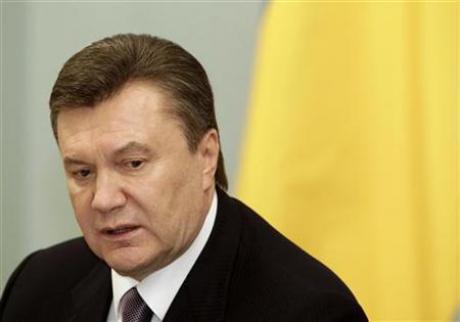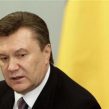
President Yanukovych in Moscow: First Round of Tough Talks?
Publication: Eurasia Daily Monitor Volume: 7 Issue: 48
By:

Viktor Yanukovych’s first visit to Russia as Ukrainian president on March 5 showed that he is no more prone to making concessions to Moscow than any of his predecessors. Yanukovych quickly came to an agreement with Russian President, Dmitry Medvedev, and Prime Minister, Vladimir Putin, on humanitarian issues, but that was natural, as Yanukovych and his voters in east and south Ukraine share with Russia the same post-Soviet mentality and share views on their common history. However, on economic matters, the Russian duumvirate will have to brace themselves for tough negotiations with Yanukovych on matters ranging from gas to customs regulations.
This was Yanukovych’s second foreign visit as head of state. Unlike Yushchenko, who paid his first foreign visit to Moscow in 2005, Yanukovych first traveled to Brussels to meet with EU officials on March 1. In response, Moscow reportedly considered lowering the status of his visit from official to working (Den, March 4). Yanukovych tried to downplay this, saying that “all roads lead to Moscow,” and that his choice of Brussels simply reflected it being the first invitation (UNIAN, March 5). This was not a comfortable start with a strong neighbor that easily takes offence. In any case, Medvedev told Yanukovych that he hoped that “a black streak” in relations would be over (www.kremlin.ru, March 5). Medvedev had shunned Yanukovych’s predecessor Viktor Yushchenko after August 2008, when Yushchenko had backed Georgia in its war with Russia.
Much was said in Moscow about the need to “turn a new leaf” in relations. Medvedev signaled his readiness to meet with Yanukovych at least twice more this year. Yanukovych said he would visit Russia in early May, and Medvedev stated that he would visit Ukraine in the first half of 2010. Medvedev suggested that he thought about Ukraine every morning (UNIAN, March 5). Boris Yeltsin once also urged Russian officials to think about Ukraine every morning.
Yanukovych and Medvedev agreed to jointly honor Red Army veterans and to celebrate the Victory Day in May together. Yanukovych promised to cancel Yushchenko’s decision to award the hero of Ukraine honor to World War II nationalist leader Stepan Bandera. Yanukovych also reiterated that he would push through parliament the legislation needed to raise the status of the Russian language (Interfax-Ukraine, March 5). These promises cost Yanukovych nothing, being in no way contradictory with his team’s views and his election promises. Regarding Bandera, not only Russia but also the European Parliament condemned Yushchenko’s decision as several EU members including Poland, view Bandera as a Nazi collaborator (www.europarl.europa.eu, February 25).
There was little progress reached beyond humanitarian issues. Commenting on the Russian Black Sea Fleet base in Sevastopol, Yanukovych said that consultations would continue and that Medvedev shared his view: “this issue is complicated” (Interfax-Ukraine, March 5). Moscow wants to extend its navy’s stationing in Sevastopol beyond 2017, as agreed in 1997, but this would contradict the Ukrainian constitution.
The Kremlin duumvirate was reluctant to discuss gas with Yanukovych, who is determined to revise the January 2009 gas contract with Gazprom. Ahead of his visit, Yanukovych had signaled that gas would be among the main issues on his agenda. He said in an interview with the BBC Ukrainian Service on March 1 that he would push for a revision of the contract with Russia, which was concluded by Yanukovych’s arch-rival Yulia Tymoshenko, who was ousted as prime minister on March 3. Yanukovych said the price for Ukraine was not fair.
Ahead of Yanukovych’s visit, the Kommersant-Ukraine daily said on March 5, citing sources in Yanukovych’s team, that his main task in Moscow would be to lower the gas price for Ukraine from the current $305 per 1,000 cubic meters to as low as $205. The daily also predicted that Yanukovych would try to persuade Moscow to either abandon the South Stream gas pipeline project, or correct it to allow the participation of Ukrainian companies. If no agreement was reached, the daily’s sources in Yanukovych’s team said, Kyiv might consider resuming gas exports to central Europe, which were abandoned in the mid-2000’s at Moscow’s insistence, and importing liquefied natural gas from Algeria or Qatar in order to lessen dependence on Russian gas. Despite, Yanukovych’s determination, Russian Energy Minister Sergei Shmatko said the gas price issue was not discussed during Yanukovych’s meeting with Medvedev. Shmatko suggested it might be raised once a new Ukrainian cabinet is formed (Interfax-Ukraine, March 5).
Putin invited Yanukovych to join the customs union of Russia, Belarus, and Kazakhstan. However, Yanukovych told the Russian Vesti TV on March 6 that Ukraine as a World Trade Organization (WTO) member could only join the union on WTO conditions. Russia, Belarus, and Kazakhstan, are only in talks to join the WTO, while Ukraine joined in 2008. In an interview to Euronews, Yanukovych said he could not see a clear picture of what Ukraine would be doing in the customs union and how it might benefit from membership. Yanukovych also ruled out recognition of the Georgian breakaway regions of South Ossetia and Abkhazia (www.euronews.net, March 5).




